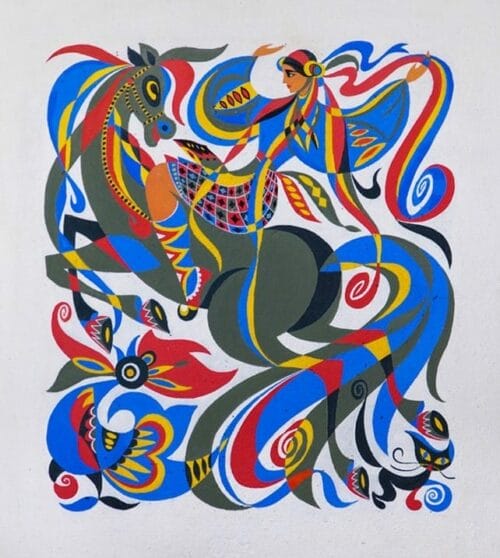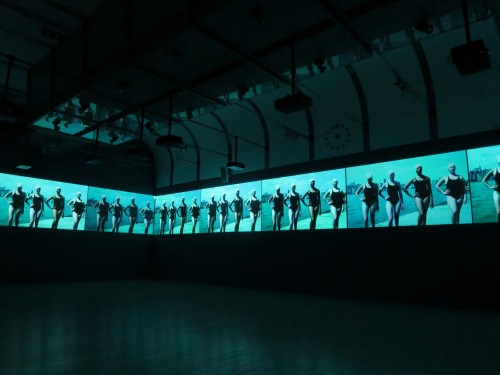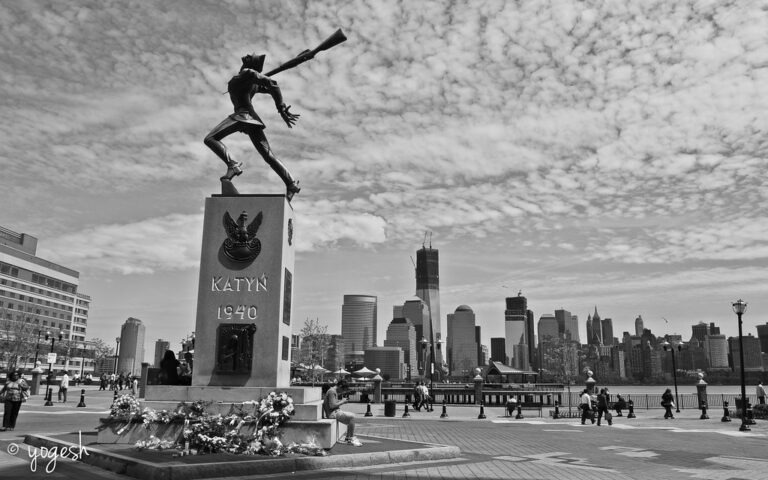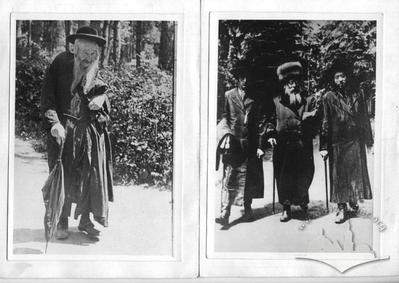2020s
Primary Sources

“Oh, in the meadow blooms the red viburnum,” a Ukrainian resistance song
This source is an audio recording of the folk version of the one of the most popular Ukrainian resistance songs. It is known by various titles: “The rifleman’s Anthem,” [Cтрілецький гімн] “The song of the viburnum,” [Пісня про калину] or “Oh, in the meadow blooms the red viburnum” [Ой у лузі червона калина]. The song’s worldwide spread was facilitated by the performance of Andriy Khlyvnyuk, the lead singer of the Boombox band, who on February 28, 2022, the fourth day of Russia’s full-scale attack on Ukraine, sang only the first stanza of the song. His performance on St. Sophia Square in Kyiv led to the emergence of remixes. Among the many performers are...
Reflections

Sashko Drugli’s “Colonial History of Homophobia in Ukraine”
The video by Sashko Drugli, posted in May 2024, aims to prove that homophobia in Ukraine is a consequence of Russian colonial policies. The author suggests that homophobia has nothing to do with Ukrainian traditions and calls it a “Russian colonial import.” He does that by explaining how Russian homophobic readings of Christian writings enforced by the Russian Orthodox Church are likely to be the reason for Ukrainian Christian-based homophobia. He then brings forward an interpretation of forced celibacy in Zaporozhian Sich as an equal treatment of both homosexual and heterosexual relations. Sashko Drugli proposes that homophobia in Ukraine developed after the Russian empire defeated Zaporizhian Sich and criminalized "sodomy, which he compares...
The course aims to problematize politics as a practice of contestation that engages with the meanings of modern historical events. Combining approaches from political theory, intellectual history, and social theory, it introduces students to various academic and public discussions on wars, revolutions, modalities of peace, and their political interpretations. To do so, the course reconsiders uncertainty as the key quality of historical events, which manifests both in the course of their development and in later reinterpretations. The course intends to introduce students to critical work with historical sources and master the critical analysis of texts, debates, and events.
In the last decade, the Ukrainian parliament has issued two laws outlining the legal framework for dealing with the Russian imperial and Soviet past. These laws have sparked numerous scholarly debates on how to address the imperial past, Ukraine's status as part of the Romanov Empire and the Soviet Union, and what to do with the cultural products created over the centuries. This course aims to explore the Soviet legacy in present-day Ukraine and provide students with the necessary theoretical and methodological tools for studying, researching, and writing about Soviet history and culture. The implications for modern Ukrainian identity and politics, particularly in the context of the ongoing war with Russia, will be...
This course, created by Prof. Sonya Bilocerkowycz, will examine how Ukrainian writers, filmmakers, and artists depict experiences of war, displacement, ecocide, colonial resistance, and other urgent concerns. Not only that, but we’ll consider how thinking alongside the work of Ukrainian creators can help us strategize ways to address global challenges as well as issues in our local communities. In signing up for this course, students agree to read and write frequently, to share their thoughtful impressions with others, and to help foster an environment of respectful dialogue and collective curiosity.
The course aims at a critical, in-depth exploration of how sexuality is intertwined with other epistemic categories and social differentials from a decolonial perspective and how the project of decolonization might look in the context of Ukraine. The course was created for Invisible University for Ukraine certificate program of the Central European University.
Russia’s war of aggression against Ukraine has prompted many to reconsider Ukraine’s relationship to the question of what it means to “decolonize.” This present-day revaluation of Ukraine’s complex imperial inheritances has centered primarily on Ukraine’s historical relationship to the Russian Empire (and the Russocentric Soviet Union), often to the exclusion of Ukraine’s Ottoman, Austro-Hungarian, and other imperial inheritances. This tragic moment of reflection raises a number of bedeviling questions. How do we narrate a decolonial history of Ukraine? Is it possible, or desirable, to disentangle Ukrainian culture from empires of the past and present? Can we imagine a future political and economic order for Ukraine that is not wholly dependent upon more powerful...
The course explores the history of Russia as an empire from Peter I up to now in the methodological perspective of the new imperial history. What are the historical preconditions and sources of Russian imperialism and militarism? How did the small principality of North-Eastern Europe manage to create the largest empire in the world? To what extent the Russian Empire of the 18th and 19th centuries differed from European colonial empires as well as eastern imperial polities such as Ottoman Empire and China? How did the imperial nationalities policies emerge and evolve? What role did the competition between "great powers" play in turning Russia into an empire? The course attempts to answer these...
The field of social history has achieved the edge of its popularity in 1950-1980s. It was strongly connected with other disciplines, such as economics, demography, sociology, and allowed historians to reach a much wider range of research themes. Since the 1960s, the social history of the Jewish people became important and influential part of the studies. Historians were exploring the possibilities to study Jewish community with new tools and integrating different representatives of Jewish community – workers, women, immigrants, criminals - in a research. Since 1990s historians of Jewish past shifted their interest to cultural studies. However, in the last years, we can see an economic turn, which signifies the search for a...
The aim of the course is to get to know how to analyze examples of visual culture, including: fiction films and documentaries, video, photography. Both contemporary and historical materials will be studied, together with theoretical texts and publications (from the area of film and media studies, anthropology, cultural studies and history. Although images are mostly seen, if you want to really know them and understand them really well, you must not only "see" them but also "read" them, that means to analyze them as a complex message/ text. That is why at our course we will firstly discuss some terms and categories, that would help us to read images such as: composition, convention,...
From Lviv to New York City, walking tours are a unique form of teaching and public history, transcending the everyday interactions of the classroom. On an urban walking tour, students go to the city but the city also comes to them, often in unexpected ways. This course will provide students with a focused analysis of the walking tour as a tool for higher education and for public history.
This course forms a part of Jewish History, Multiethnic Past, and Common Heritage: Urban Experience in Eastern Europe summer school.
The course will cover the major development of the East European Jewry from the mid-eighteenth century till the present. More specifically, it will focus on the apparently largest category of modern Jewish history, i.e. modernity itself. The course will start with the discussion of what modernity means in contemporary scholarly discourse, and—more specifically—how it is applied today in historiography of East European Jewry. This introduction will provide a frame for the focus of the course: the analysis of the changing life patters and differing strategies of adopting, rejecting, or negotiating modernity in every-day lives of East European Jews.





